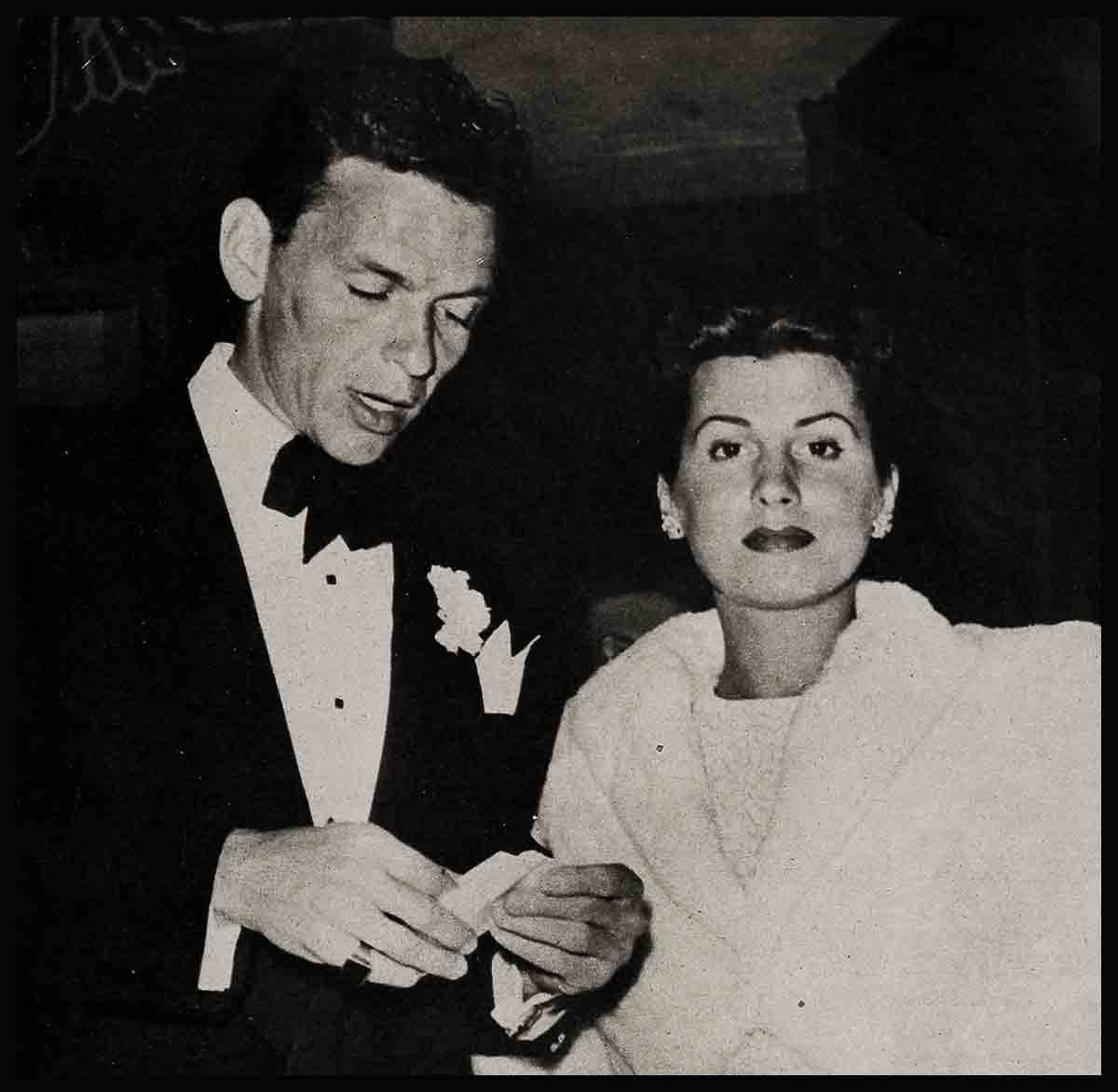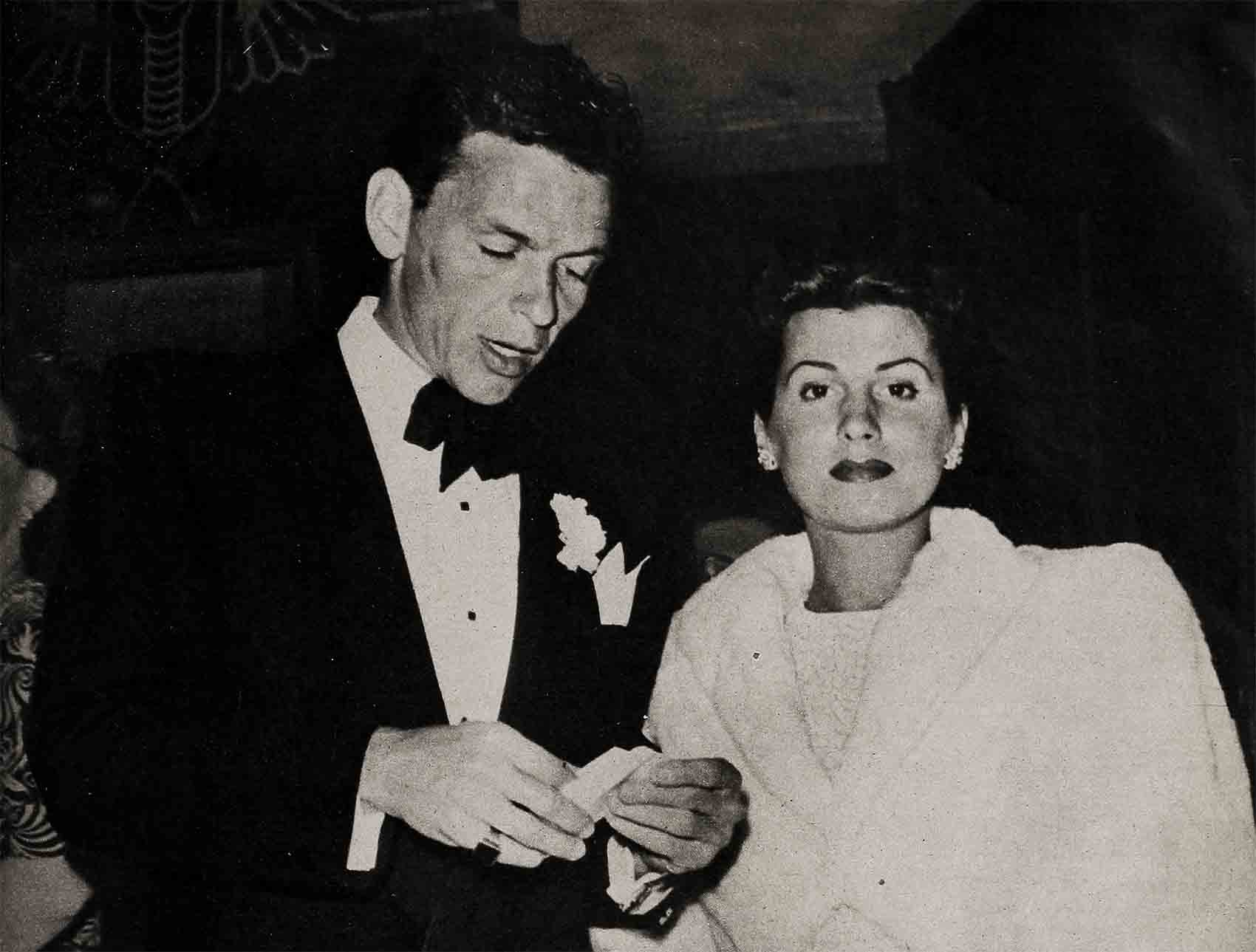
A Love Like Nancy’s—Frank And Nancy Sinatra
Telling about it later, Nancy said that when Frank came to the house to ask for the divorce, he was like a little boy—humble and defenseless.
It was towards the end of May. He’d flown in from New York, to visit his three children and talk to her.
Their relationship had long since cooled (they’d legally been separated for more than a year) but there was sincere deference and respect in Frank’s attitude.
“Nancy,” he said simply, “I’d like my freedom. How about a divorce?”
Nancy looked at this man who through the years had brought her great happiness and great heartache, and in a sweet voice which hardly broke the silence, she said, “If a divorce is what you want, Frank, you most certainly may have it.”
She smiled a little, and the expression in her eyes was gentle.
“Thanks,” Frank Sinatra said. “Thanks very much, Nancy.”
They talked then about the children, the house, the financial settlement—but they carefully avoided the subject of Ava Gardner.
“After all,” said Nancy, “I felt that I had no right to ask him why he wanted his freedom. It was none of my business. My business is looking after our three children.”
There has been much gossip and many stories about Nancy Sinatra’s refusal to give Frank a divorce. All of it has been completely false.
“The first time he came to see me,” Nancy says, “and asked for his freedom, I gave it willingly. What I would not do, what I could not do, was discuss divorce with Frank over the long-distance phone. It was too important a subject. It involved not only our personal lives but the lives of our children.”
Several times during the past year, especially after Ava had flown to New York to see him, Frank had phoned Nancy from the Hampshire House or The Drake.
“Want to talk about a divorce,” Frank would say. Ava, sitting across the room, would wait expectantly, only to watch Frank put down the phone receiver in disappointment.
Sensible Nancy, gallant Nancy just would not discuss divorce on the telephone. He would have to call on her in person.
Until this May, Frank Sinatra never did. Thousands of fans wrote Hedda Hopper and Louella Parsons demanding to know why Nancy wouldn’t give Frank a divorce.
“Is it because of her religion?” they asked. “Is she just being spiteful? Is it out of sheer meanness?”
These were the uninformed, the misguided, the Sinatra fans, the Gardner hopefuls. These were the people who thought they knew all there was to know about the triangle—and yet, knew nothing.
Nancy was never spiteful or mean. Maybe way back when Frank was guilty of his first indiscretions—maybe then, she had felt slighted, cast aside, and bitter. But not during the past five years.
She and Frank had separated previously. She knew all about Frank’s infatuation for Lana Turner, his pursuit of Judy Garland; but she knew, too, that he was basically a kind man, that his talent for entertainment was tremendous, that the children loved him deeply. And she accepted him as he was with all his obvious weaknesses and his many strengths.
She did this because she loved him. As any honest man in the entertainment world will tell you, Frank’s greatest strength, in his meteoric rise as a crooner, was the simple and honest love of Nancy Sinatra. In all his moments of defeat, and despair—she stood by to give him courage.
She felt always that he was a wandering little boy, and that like most truants he would eventually straggle home.
“When he is all through playing around,” she once said, “when no one else wants him, I will take him back.”
Nancy felt that time, and the children, and the marital memories, mostly the memories, were on her side, and would weigh heavily in Frank’s mind. She thought that try as he might, he would never forget them, and they would always bring him back.
After all, hadn’t she and Frank grown up together? Wasn’t it she who was earning $20 a week at the American Type Founders in Elizabeth when Frank was singing at the Rustic Cabin outside of Englewood for $15 a week?
Wasn’t it she who told him to go on the road with Harry James, and not to worry about her even though she was pregnant? Because $65 a week was better than $15.
Wasn’t it she who rented the cute little apartment in Jersey City with the furniture they paid for on time? And that Christmas when there wasn’t any money in the house and Frank was deathly ill in Cleveland, wasn’t it she who sent him a pair of gloves with a dollar bill stuffed in sh finger?

When Frank got the gift he cried like a baby. And years later, he said, “There I was 600 miles away from the girl I loved, alone and sick and dying—and then this thoughtful gift came. Somehow I knew I’d just have to get well and work for my Nancy and make her proud of me. And by heaven, I did! My temperature began to fall, and in the morning I was my old self once more.”
Ava may have Frankie now, but Nancy still has those unforgettable memories—of Frank’s triumphs, of his amazing growth from a kid who collected bottles for the deposit money to a singer who collects $10,000 a week and up.
Neither Nancy nor Frank can ever forget that year when he was all of 25 and earning $4,500 a week at the New York Paramount. That was the year Frank bought a little house for Nancy and his daughter in Hasbrouck Heights, New Jersey. It was a cute little Cape Cod cottage, located at 220 Lawrence Avenue, and it was the first house they’d ever owned.
That, too, was the year Frank bought Nancy an engagement ring. “I was too poor to buy her one at the time of our engagement,” Frank explained, “so I made it up to her. I also bought her a fur coat.”
Nancy realized almost two years ago that these memories, in the final analysis, were not strong enough to bring Frank home. At that time, Frank packed a wardrobe trunk, moved out of his house into his office, and began presenting Ava Gardner with a dazzling assortment of gifts ranging from diamonds to:a spinet piano.
For a while, Nancy hoped that this would prove to be a short-lived infatuation. It wasn’t. It was the real McCoy. Ava had made sure of that.
She wasn’t walking out on a limb. She wanted Frank’s definite assurance that he and Nancy were contemplating a divorce or a legal separation.
Ava Gardner is an honorable girl. She made it unmistakably clear to Frank that she would never come between a man and his wife. This romance had to be for keeps.
Frank assured Ava that it was. He had his lawyers draw up a legal separation document. Nancy signed it at once, because that’s what Frank wanted.
There are some persons who, knowing Frank well, say that he used the legal separation as a device to test his love for Ava and vice versa; to see if their feelings for each other would continue the same if both were free.
That Frank is madly in love with Ava at this writing there can be no doubt. In his diary, 1951 will go down as the year of trans-continental. commuting. Every Saturday night, after his television show in New York was over, Frank would dash to La Guardia Airport and catch the American Airlines Mercury to Los Angeles.
“It got so,” one airline stewardess reported, “that we looked on him as a homing pigeon.”
Once in California, Frank would rush to Ava’s house or they would meet at Palm Springs, but always they were together.
A few weeks before she started to work with Clark Gable on Lone Star, Ava flew to New York to visit Frank. At the time, she’d been going with him over a year.
Ava asked Frank how good the chances were of his getting that divorce they had talked so much about.
Frank said he had spoken to Nancy on the phone and that Nancy had refused to discuss the subject.
Ava was insistent. Why didn’t Frank fly to the Coast and talk to Nancy about it? After all, Nancy was a reasonable woman. Ava had met her some years before at a party in the Sinatra house. Nancy seemed to have hundreds of friends. Surely, such a sweet, friendly person couldn’t be unreasonable?
Frank said he knew Nancy better than anyone in the world, and that he would handle the problem in his own way. Ava and Frank quarreled, and Ava flew back to the Coast.
Ava had endangered her career to fall in love with Frank. She had ignored the counsel of her best friends. If Frank made no effort to marry her, she’d seem to be a silly person who had let her heart rule her head.
It wasn’t only public opinion that made Ava fly back in a huff. Ava will be 30 years old this Christmas. More than anything else in life, she wants a family. She is willing to give up her career for a successful marriage. She feels strongly that she and Frank can love each other happily ever after. Only they’d best get a legal start in a hurry.
Back in Hollywood, she began dating Howard Duff again, a titled English visitor, and a few of the local boys.
Quicker than you could say Jack Frost, the news wafted back to Frankie Sinatra ensconced in the Hotel Drake, New York. Frank taxied out to La Guardia and caught the first plane to Hollywood, where he joined Ava on the set of Lone Star and lunched with her at the commissary.
He told Ava that he was going to ask Nancy for a divorce.
True to his word, he did, and Nancy agreed to give it to him. The announcement made headlines in June.
If the divorce is obtained in California, one year will have to elapse before it becomes final, and Frank can marry again.
If the divorce is obtained in Nevada, a Gardner-Sinatra wedding is a distinct possibility by October of this year.
Nancy Sinatra says she will do everything she possibly can, “to make things happy for everyone. I feel absolutely no bitterness,” she repeats. “Frank has had his freedom for some time now, and what he does is his business alone. He is a wonderful person, and while I don’t know Miss Gardner, I’m sure she is, too. I have lived in Hollywood for years and I’ve only heard the very best spoken about her.
“With all my heart, I wish the both of them only happiness.”
A love like Nancy’s is rare, indeed.
THE END
—BY IMOGENE COLLINS
It is a quote. MODERN SCREEN MAGAZINE SEPTEMBER 1951





No Comments